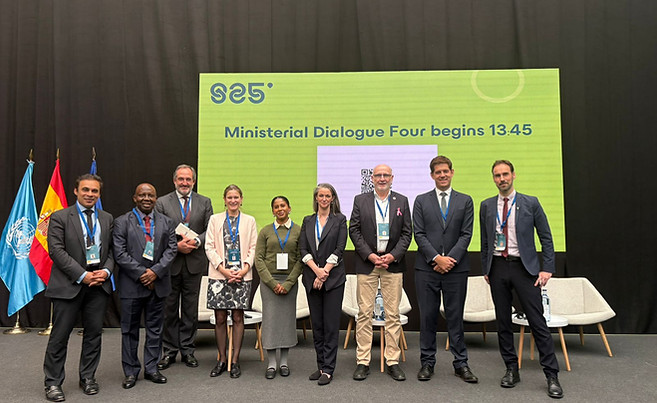Report on the 2025 Sector Ministers Meeting
(SWA / UNICEF)
10/30/2025

Source: AquaFed
Last week in Madrid, AquaFed was honoured to participate in the 2025 SWA Sector Ministers Meeting, where over 60 ministers from 45 countries, together with a wide range of partners from civil society, utilities, and the private sector, gathered to exchange good practices and actionable strategies to better integrate water, sanitation, resource management, and climate resilience at the national and transboundary level.
Ministers from diverse sectors—including health, rural development, public works, water, sanitation, and environment—shared their analyses and concrete strategies to overcome persistent challenges and accelerate progress toward water-related Sustainable Development Goals (SDGs) through integrated and climate-resilient approaches.
The 2025 SWA SMM was also profoundly marked by the memory of SWA CEO Catarina de Albuquerque. The numerous tributes paid to her during the event allowed for a collective recognition of her legacy and a deep appreciation of the magnitude of her impact in advancing human rights within the water and sanitation sector.
Commitment at the highest level is key for effective integration
Strategies : Integrate water, sanitation, resource management and climate resilience is not only a technical issue but a political matter that require prioritization and collaboration at the highest level of State. Leadership and clear targets from heads of State are essential to coordinate cross-sectoral approach, interministerial action and ensure continuity in objectives’ implementation, even in politically unstable contexts. Indeed, when water is effectively prioritized it helps depoliticize the sector and sustain implementation. However, in contexts where prioritization is difficult, alternative strategies include mainstreaming water and sanitation into other national priorities (e.g rural development, agriculture, education, health…).
Examples of means and actions for effective prioritization :
-
Institutional coordination : interministerial committees, coordination mechanisms at national and local levels to foster political dialogue and stakeholder engagement, integration of water and sanitation issues in all water-related ministries.
-
Legal reforms and financial planning : rights recognition and prioritization in budget allocation.
Enabling climate resilient water and sanitation services
Main prerequisites / conditions for climate-resilient planning and adaptive water governance highlighted by participants :
-
Hydric security risk assessment and management through the data collection and analysis, including community-based and tradition knowledge sharing; the development of water security indicators informing multisectoral risk quantification for energy, agriculture, or industry.
-
Education and capacity development at all level, including local community and head of technical staff. Example of solution : AquaFed PPP water Hub.
-
Policy integration is crucial to overcome the inefficiency induced by fragmentation across sectors. Solutions include: federated policies and governance planning, joint multi-sectoral planning (e.g., water-sanitation-climate or water-health), integration of WASH in NAPs and NDCs.
-
Technical choice and engineering innovations allow for better integration: nature-based solutions (NBS) and resilient infrastructures, revised construction standards, resources diversification (e.g reuse for irrigation or aquifer recharge, desalination, transboundary transfer…)
Finance integrated approaches and strategies
Strengthening integrated investment in the sector, particularly from the private sector, was highlighted by participants to be essential to foster efficiency and climate-resilient services and resources management.
Conditions to attract private finance:
-
Institutional : clarification of the roles and responsibilities in the WASH / resources management sector, and budget prioritization of WASH or clear investment frameworks for private sector.
-
Legal & regulatory framework : legislative reforms allowing for private investment in WASH, implementation of strong regulatory oversight.
-
Shift in the narrative related to water and sanitation services : water and sanitation are not charity, but essential social services with specific rules, value, cost, and investment potential.
-
Strengthen accountability and regular review of the progress.
Example of means and tools : Public-private partnerships contracts, development of trust fund, climate finance funds (several participants highlighted the complexity of these mechanisms), SWA mutual accountability mechanism.
Click here to see the Key Constituency Partnership Messages